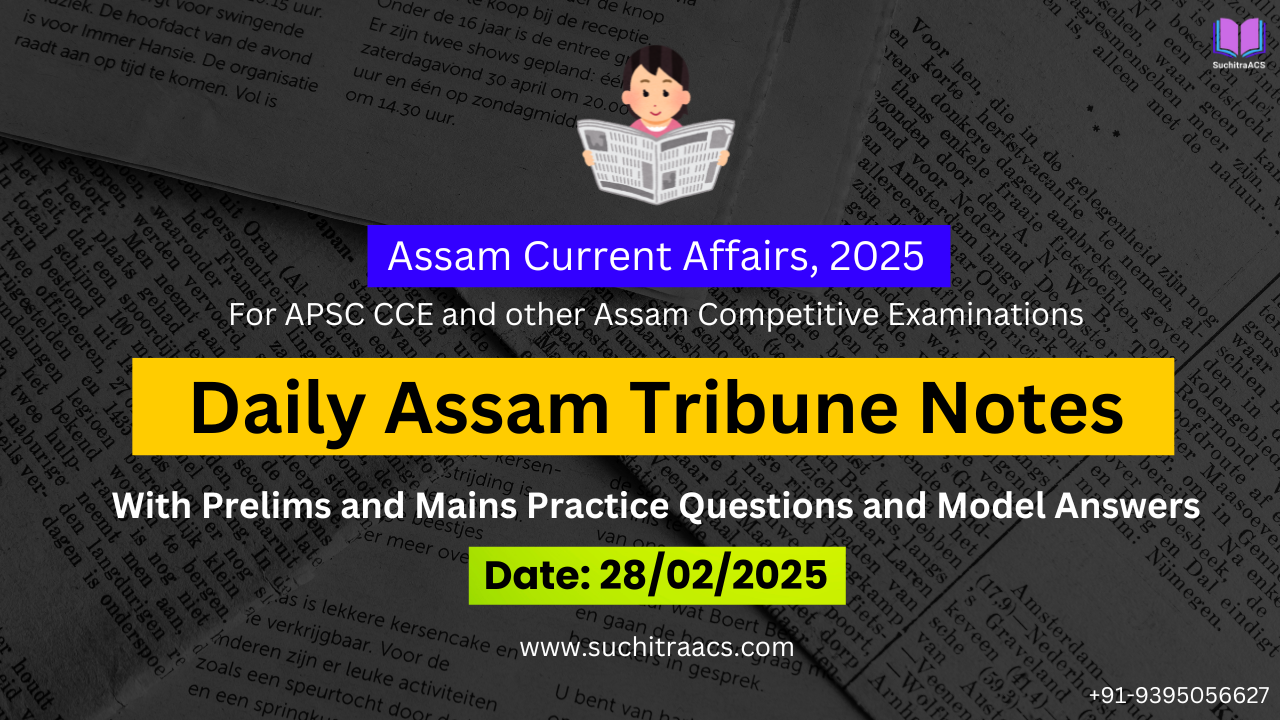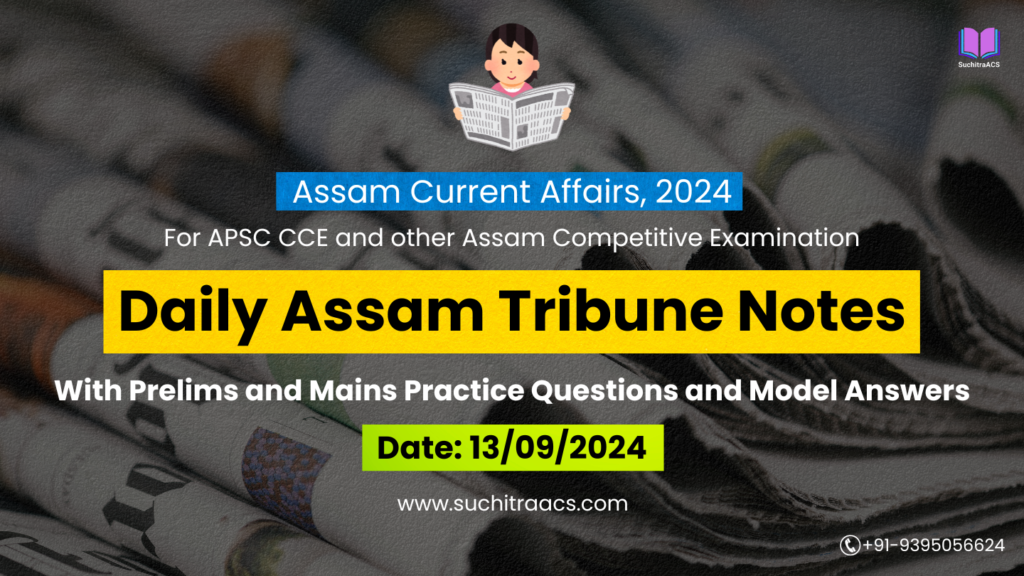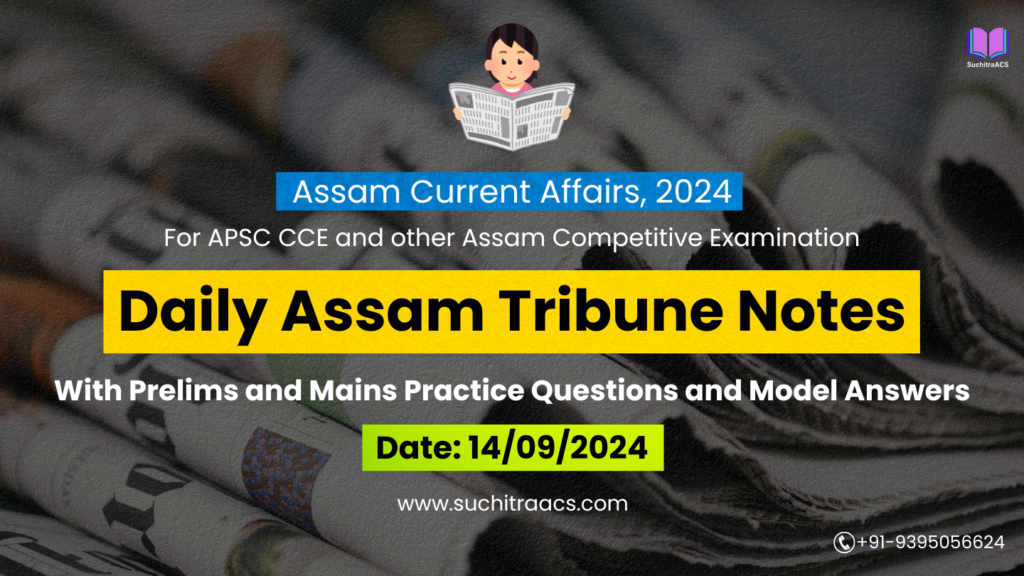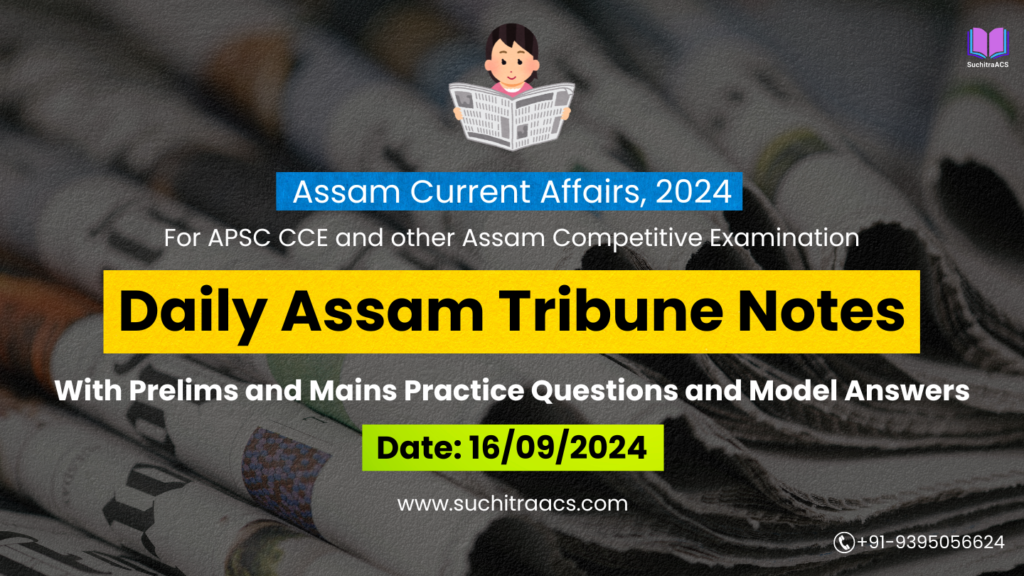APSC Current Affairs: Assam Tribune Notes with MCQs and Answer Writing (28/02/2025)
For APSC CCE and other Assam Competitive examinations aspirants, staying updated with current affairs is vital. This blog covers most important topics from the Assam Tribune today (28-02-2025). These issues are key for both APSC Prelims and Mains preparation, offering insights into the APSC CCE Syllabus.
1. Assam’s First Indigenous Semiconductor Unit at Jagiroad to Start Production in 2026
📌 GS Paper 3: Science & Technology, Manufacturing, Economy
📌 GS Paper 2: Government Initiatives, Industry Policies
Introduction
Assam is set to become a key player in India’s semiconductor industry with the establishment of its first indigenous semiconductor assembly and testing unit at Jagiroad. The unit, set to begin production in 2026, is expected to strengthen India’s self-reliance in chip manufacturing, boost employment, and attract foreign investments.
Key Points
1. Importance of Semiconductor Manufacturing in Assam
✅ Reduces India’s Dependence on Imports – Currently, India imports nearly 85% of its semiconductors.
✅ Boosts Make in India & Atmanirbhar Bharat – Strengthens domestic chip-making capabilities.
✅ Employment Generation & Skill Development – Over 2,000 jobs already created, with potential for 10,000 more.
✅ Enhances Electronics & Mobile Industry – The chips will be used in smartphones, automobiles, and defense technology.
2. Key Features of the Jagiroad Semiconductor Facility
✔️ ₹27,000 crore investment by Tata Electronics.
✔️ 15 billion chips per year production capacity.
✔️ MoUs signed with Singapore, Malaysia, and Japan-based firms for technology transfer.
✔️ Collaboration with IIT Guwahati & NIELIT for workforce training.
3. Challenges in Semiconductor Production in India
🚧 High Initial Investment & Technology Dependence.
🚧 Need for a Strong Semiconductor Supply Chain.
🚧 Availability of Skilled Workforce in Assam.
Prelims Pointers
- Semiconductors – Materials that control electric current in electronic devices.
- PLI Scheme for Semiconductors (2021) – Government initiative to boost chip manufacturing in India.
- Silicon Valley of India – Bengaluru, known for its semiconductor and IT industry.
Mains Pointers
How Will the Jagiroad Semiconductor Unit Impact India’s Tech Industry?
✅ Reduces Import Dependency on Taiwan, China, and South Korea.
✅ Encourages Foreign Investment & Strengthens Assam’s Industrial Economy.
✅ Enhances India’s Position in Global Electronics Supply Chain.
Way Ahead
✅ Expand Infrastructure & Create Semiconductor Hubs in Northeast.
✅ Attract Private Investment & Global Chip Manufacturers.
✅ Develop India’s Own Semiconductor Research & Development Ecosystem.
Conclusion
The Jagiroad semiconductor unit marks a significant step toward India’s technological self-sufficiency. If managed well, Assam can emerge as a semiconductor hub, creating thousands of jobs and transforming the Northeast’s economy.
2. Assam to Launch ‘Mission Shiksha Unnati’ to Improve School Education
📌 GS Paper 2: Education, Governance, Social Sector Initiatives
📌 GS Paper 3: Skill Development, Human Resource Management
Introduction
The Assam government has announced ‘Mission Shiksha Unnati’, a comprehensive education reform initiative aimed at improving the quality of school education, reducing dropout rates, and upgrading teaching methods. The project aligns with the National Education Policy (NEP) 2020 and focuses on digital learning, teacher training, and infrastructure development.
Key Points
1. Objectives of Mission Shiksha Unnati
✅ Enhancing Learning Outcomes in Government Schools – Implementing smart classrooms & digital tools.
✅ Reducing Dropout Rates in Rural & Tribal Areas – Special focus on girl child education & marginalized communities.
✅ Upgrading Teacher Training Programs – Modern pedagogical techniques and subject-specific training.
✅ Strengthening Vocational Education & Skill Development – Introducing industry-relevant courses for high school students.
2. Key Features of the Initiative
✔️ ₹5,200 crore investment in school infrastructure & digital education.
✔️ Deployment of AI-based student progress tracking system.
✔️ Training 50,000+ teachers under the ‘Shiksha Jyoti’ program.
✔️ Free digital tablets for students of Class 9 to 12.
3. Challenges in Implementing Education Reforms in Assam
🚧 Teacher Shortages & Training Gaps in Rural Schools.
🚧 Need for Better Internet & Electricity Connectivity in Remote Areas.
🚧 Language Barriers in Implementing Bilingual Education under NEP 2020.
Prelims Pointers
- National Education Policy (NEP) 2020 – Focuses on flexible curriculum, vocational training, and digital education.
- Samagra Shiksha Abhiyan – Central government scheme for school education reform.
- Right to Education (RTE) Act, 2009 – Guarantees free & compulsory education for children aged 6-14.
Mains Pointers
Why is Education Reform Crucial for Assam?
✅ Improves Literacy & Reduces Social Inequality.
✅ Prepares Students for Emerging Job Markets.
✅ Boosts Assam’s Position as an Educational Hub in Northeast India.
Way Ahead
✅ Public-Private Partnerships for Infrastructure & Digital Learning.
✅ Localized Content & Mother-Tongue-Based Education.
✅ Special Focus on Tribal & Remote Areas for Equal Access.
Conclusion
Mission Shiksha Unnati has the potential to transform Assam’s education system. By modernizing learning techniques, bridging digital divides, and focusing on skill development, Assam can ensure quality education for all and create a future-ready workforce.
3. Assam to Introduce ‘Green Ports Initiative’ to Boost Sustainable Inland Waterways
📌 GS Paper 3: Environment, Infrastructure, Sustainable Development
📌 GS Paper 2: Government Policies & Maritime Economy
Introduction
The Assam government has announced the ‘Green Ports Initiative’, aimed at developing eco-friendly and energy-efficient inland waterways and river ports. This initiative aligns with India’s National Green Hydrogen Mission and seeks to reduce carbon emissions, improve trade connectivity, and promote clean energy solutions for Assam’s growing inland water transport sector.
Key Points
1. Objectives of the Green Ports Initiative
✅ Developing Environmentally Sustainable River Ports – Promoting solar energy, wind power, and electric ferry systems.
✅ Boosting Assam’s Inland Waterway Trade – Strengthening logistics and cargo handling at Brahmaputra & Barak river ports.
✅ Reducing Carbon Emissions from Water Transport – Transitioning to battery-operated and hydrogen-powered vessels.
✅ Enhancing India-Bangladesh River Trade Connectivity – Expanding cross-border transport and regional commerce.
2. Key Features of the Initiative
✔️ ₹3,800 crore investment in upgrading river ports & jetties.
✔️ Introduction of LNG & Green Hydrogen-Powered Vessels.
✔️ Collaboration with Japan & Norway for Green Maritime Technology.
✔️ Integration of Digital Navigation & AI-Based Port Management Systems.
3. Challenges in Implementing Green Ports in Assam
🚧 High Initial Investment Costs for Eco-Friendly Technology.
🚧 Lack of Awareness & Training for Green Transport Operations.
🚧 Navigational Challenges Due to Siltation & Riverbank Erosion.
Prelims Pointers
- National Green Hydrogen Mission (2023) – Aims to promote hydrogen-based clean energy solutions.
- Inland Waterways Authority of India (IWAI) – Regulates water transport & river trade in India.
- National Waterway-2 (Brahmaputra River) – A major trade route under Sagarmala Project.
- Sagarmala Programme – Aims at port modernization and blue economy growth.
Mains Pointers
Why is the Green Ports Initiative Important for Assam?
✅ Reduces Dependence on Fossil Fuels & Lowers Pollution Levels.
✅ Enhances Trade & Economic Growth through Sustainable River Transport.
✅ Positions Assam as a Green Energy Hub for Northeast India.
Way Ahead
✅ Encouraging Private Investment & Public-Private Partnerships (PPP).
✅ Expanding Digital Monitoring & Smart Port Infrastructure.
✅ Strengthening Research & Development in Green Maritime Technologies.
Conclusion
The Green Ports Initiative is a crucial step towards sustainable inland waterways. By integrating clean energy solutions, modern infrastructure, and digital monitoring, Assam can become a leading hub for eco-friendly maritime trade and transport in India.
4. Assam to Host Northeast’s First Global Climate Summit in 2025
📌 GS Paper 3: Environment, Climate Change, Sustainable Development
📌 GS Paper 2: International Relations, Government Policies
Introduction
Assam has announced plans to host Northeast India’s first Global Climate Summit in 2025, focusing on climate resilience, sustainable development, and green energy solutions. The summit will bring together scientists, policymakers, global investors, and environmental activists to address the unique climate challenges faced by Assam and the Northeast region.
Key Points
1. Objectives of the Global Climate Summit
✅ Addressing Climate Change & Its Impact on Northeast India – Focusing on flood management, biodiversity conservation, and sustainable agriculture.
✅ Promoting Green Energy & Carbon Neutral Strategies – Expanding hydropower, solar, and green hydrogen projects.
✅ Strengthening Regional & Global Climate Partnerships – Collaborating with international organizations and climate think tanks.
✅ Encouraging Climate-Resilient Infrastructure & Urban Planning – Developing smart, eco-friendly urban solutions.
2. Key Features of the Summit
✔️ Participation from UN Environment Programme (UNEP) & International Climate Experts.
✔️ Special Focus on Climate-Resilient Agriculture & Indigenous Knowledge.
✔️ ₹4,500 crore investment announced for renewable energy & afforestation projects.
✔️ Discussions on Assam’s Wetland Protection & Wildlife Conservation Policies.
3. Challenges in Tackling Climate Change in Assam
🚧 Severe Floods & River Erosion Due to Brahmaputra’s Changing Course.
🚧 Deforestation & Habitat Loss Threatening Assam’s Biodiversity.
🚧 Need for Better Climate Adaptation Policies & Community Awareness.
Prelims Pointers
- Paris Agreement (2015) – A global climate accord aimed at limiting global warming to below 2°C.
- National Adaptation Fund for Climate Change (NAFCC) – Supports climate resilience projects in India.
- Assam Climate Action Plan (2022-2030) – Assam’s roadmap for sustainable growth & disaster management.
- Wetland Conservation & Management Rules (2017) – Guidelines for preserving India’s wetlands like Deepor Beel.
Mains Pointers
Why is a Global Climate Summit Important for Assam?
✅ Raises International Awareness About Assam’s Climate Vulnerabilities.
✅ Attracts Green Investments for Renewable Energy & Conservation.
✅ Encourages Policy Innovations for Sustainable Urban & Rural Development.
Way Ahead
✅ Expanding Disaster Management Strategies for Flood-Prone Regions.
✅ Developing a Northeast Green Energy Corridor.
✅ Strengthening Global & Regional Collaborations for Climate Solutions.
Conclusion
The Global Climate Summit 2025 in Assam is a historic event for Northeast India, positioning the region as a leader in climate action and sustainability. By focusing on green energy, environmental conservation, and climate adaptation, Assam can set a new benchmark for sustainable development.
APSC Prelims Practice Questions
1. Assam’s First Indigenous Semiconductor Unit at Jagiroad
Question 1
Which of the following benefits are expected from Assam’s first semiconductor manufacturing unit in Jagiroad?
- Reducing India’s dependence on semiconductor imports.
- Strengthening India’s position in global electronics supply chains.
- Enhancing employment opportunities in Assam.
- Promoting organic farming in the state.
Select the correct answer using the codes below:
(a) 1 and 2 only
(b) 1, 2, and 3 only
(c) 2, 3, and 4 only
(d) 1, 2, 3, and 4
✅ Answer: (b) 1, 2, and 3 only
🔎 Explanation:
- Statements 1, 2, and 3 are correct – The semiconductor unit will reduce import dependency, create jobs, and improve India’s position in electronics manufacturing.
- Statement 4 is incorrect – The semiconductor industry is not related to organic farming.
2. Assam to Launch ‘Mission Shiksha Unnati’ to Improve School Education
Question 2
Which of the following initiatives are included under Mission Shiksha Unnati?
- Deployment of AI-based student progress tracking systems.
- Free digital tablets for students from Class 9 to 12.
- Introduction of coding and robotics in school curriculums.
- Special teacher training programs under ‘Shiksha Jyoti’.
Select the correct answer using the codes below:
(a) 1 and 2 only
(b) 2 and 3 only
(c) 1, 2, and 4 only
(d) 1, 2, 3, and 4
✅ Answer: (d) 1, 2, 3, and 4
🔎 Explanation:
- All four initiatives are part of Mission Shiksha Unnati, which aims to modernize Assam’s school education system.
- The focus is on digital learning, AI-driven assessments, and advanced skill development programs.
3. Assam to Introduce ‘Green Ports Initiative’ to Boost Sustainable Inland Waterways
Question 3
Which of the following technologies will be used in Assam’s Green Ports Initiative?
- Hydrogen-powered vessels
- AI-based port management systems
- Blockchain-based cargo tracking
- Solar-powered electric ferries
Select the correct answer using the codes below:
(a) 1 and 2 only
(b) 2 and 4 only
(c) 1, 2, and 4 only
(d) 1, 2, 3, and 4
✅ Answer: (d) 1, 2, 3, and 4
🔎 Explanation:
- The Green Ports Initiative will promote clean energy, digital tracking, and AI-driven operations.
- All four technologies are key components of the eco-friendly port infrastructure plan.
Question 4
Which of the following rivers in Assam are designated as National Waterways (NW)?
- Brahmaputra River
- Barak River
- Lohit River
- Dhansiri River
Select the correct answer using the codes below:
(a) 1 and 2 only
(b) 1, 2, and 3 only
(c) 2, 3, and 4 only
(d) 1, 2, 3, and 4
✅ Answer: (a) 1 and 2 only
🔎 Explanation:
- Brahmaputra River (NW-2) and Barak River (NW-16) are National Waterways.
- Lohit and Dhansiri Rivers are not classified as National Waterways.
4. Assam to Host Northeast’s First Global Climate Summit in 2025
Question 5
Which of the following themes will be discussed at Assam’s Global Climate Summit 2025?
- Climate-resilient agriculture
- Renewable energy expansion
- Wildlife conservation and wetland protection
- Nuclear power development in Northeast India
Select the correct answer using the codes below:
(a) 1 and 2 only
(b) 1, 2, and 3 only
(c) 2, 3, and 4 only
(d) 1, 2, 3, and 4
✅ Answer: (b) 1, 2, and 3 only
🔎 Explanation:
- Climate-resilient agriculture, renewable energy, and conservation efforts are major themes of the Global Climate Summit.
- Nuclear power development is not a focus of the summit, making statement 4 incorrect.
Question 6
Which of the following international agreements focus on climate action and sustainability?
- Paris Agreement (2015)
- Kigali Amendment to the Montreal Protocol
- Sendai Framework for Disaster Risk Reduction
- Outer Space Treaty (1967)
Select the correct answer using the codes below:
(a) 1 and 2 only
(b) 1, 2, and 3 only
(c) 2, 3, and 4 only
(d) 1, 2, 3, and 4
✅ Answer: (b) 1, 2, and 3 only
🔎 Explanation:
Outer Space Treaty (Statement 4) is unrelated to climate action.
Paris Agreement – Aims to limit global warming below 2°C.
Kigali Amendment – Focuses on phasing out hydrofluorocarbons (HFCs) to combat climate change.
Sendai Framework – Deals with disaster risk reduction, including climate-related disasters.
APSC Mains Practice Question
Mains Question
“Climate change poses a significant threat to Assam due to its geographical and ecological vulnerabilities. Analyze the key climate-related challenges faced by the state and discuss the role of the upcoming Global Climate Summit 2025 in addressing these issues. Suggest long-term strategies for climate resilience in Assam.” (250 words, 15 marks)
Model Answer
Introduction
Assam is highly vulnerable to climate change impacts, including floods, river erosion, biodiversity loss, and extreme weather events. The Global Climate Summit 2025, hosted by Assam, aims to address these challenges through policy discussions, green investments, and international collaborations.
Key Climate-Related Challenges in Assam
✅ Recurrent Floods & Riverbank Erosion
- The Brahmaputra and Barak rivers frequently overflow, causing widespread displacement and economic losses.
- Erosion leads to loss of agricultural land and biodiversity hotspots.
✅ Rising Temperatures & Extreme Weather Events
- Unpredictable monsoon patterns impact agriculture and water availability.
- Heatwaves and prolonged dry spells reduce productivity in tea plantations.
✅ Biodiversity Loss & Habitat Destruction
- Deforestation and urban expansion threaten species like the one-horned rhinoceros.
- Wetlands like Deepor Beel are shrinking due to pollution and encroachment.
✅ Climate-Induced Health Risks
- Rising temperatures increase cases of vector-borne diseases like malaria and dengue.
- Water contamination from floods leads to gastrointestinal diseases.
Role of the Global Climate Summit 2025
✅ Encouraging Climate-Resilient Infrastructure – Discussions on flood-resistant housing and smart cities.
✅ Promoting Green Energy & Carbon Neutral Policies – Investment in solar, wind, and hydro energy projects.
✅ Strengthening International Partnerships – Collaboration with UNEP, World Bank, and ASEAN nations for sustainability projects.
✅ Enhancing Conservation Efforts – Strategies for wetland restoration, afforestation, and eco-tourism.
Long-Term Strategies for Climate Resilience in Assam
✅ Sustainable River & Flood Management
- Implementation of early warning systems, embankment strengthening, and river dredging.
- Eco-sensitive floodplain zoning to prevent unplanned construction.
✅ Adoption of Climate-Smart Agriculture
- Promotion of drought-resistant crops and organic farming techniques.
- Watershed management and rainwater harvesting to ensure year-round water availability.
✅ Renewable Energy Expansion
- Investing in solar microgrids, wind farms, and hydroelectric projects.
- Encouraging public-private partnerships (PPPs) for clean energy innovations.
✅ Strengthening Environmental Policies & Community Engagement
- Enhancing wetland and forest conservation laws.
- Involving local communities in afforestation and sustainable tourism initiatives.
Conclusion
The Global Climate Summit 2025 is a significant opportunity for Assam to address its climate challenges through sustainable policies and international collaborations. By focusing on flood control, green energy, and conservation efforts, Assam can build long-term climate resilience while promoting inclusive and sustainable development.
✨ APSC Prelims Crash Course, 2025
at most affordable rate in Assam!

🔔 Join Our WhatsApp Study Group!
For exclusive access to premium quality content, including study materials, current affairs, MCQs, and model answers for APSC CCE and other Assam competitive exams.
Click here to join: SuchitraACS Study WhatsApp Group
📚 Want to know more about SuchitraACS’s most affordable courses?
Click here to know more: SuchitraACS Courses for APSC CCE and Assam Competitive Examinations




